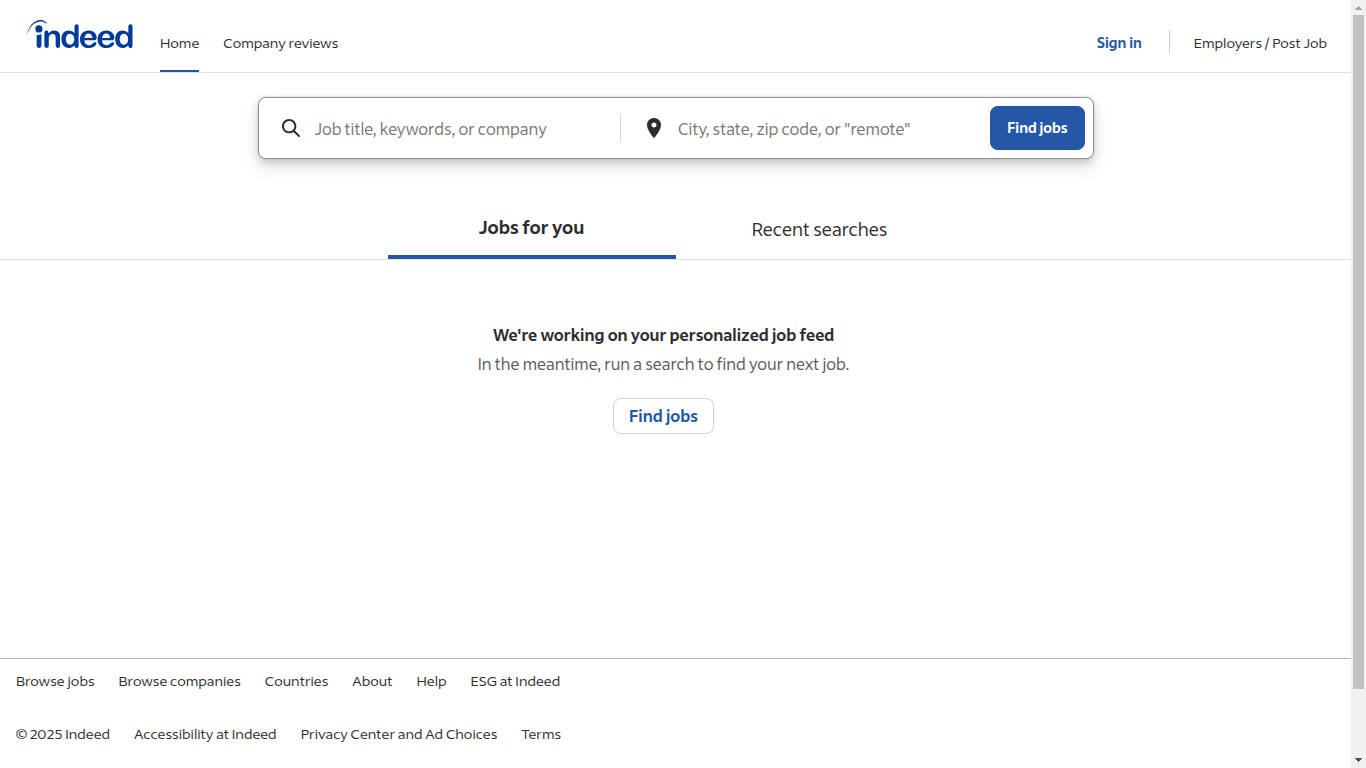I used Indeed for most of the salary investigations and company reviews, but you can use it for job search and much more as we will see in this blog.
Thank you for reading this post, don’t forget to subscribe!
Please support the blog by clicking ads and join the monetize programs , coming soon.
Indeed has become a very popular platform for finding employment, and it offers several benefits for those seeking remote work. Some of these are:
Vast Database of Remote Jobs: Indeed aggregates job listings from numerous sources, resulting in a large and diverse pool of remote work opportunities. This increases the chances of finding a suitable position. It allows users to filter searches specifically for “remote” or “work from home” jobs, streamlining the search process.
User-Friendly Search and Filtering: Indeed provides robust search filters that allow users to narrow down job listings based on criteria such as location, salary, job type, and keywords. This makes it easy to find remote positions that match specific requirements.
Company Reviews and Salary Information: Indeed offers company reviews and salary data, which can help job seekers gain valuable insights into potential employers and determine if a remote position aligns with their career goals.
Resume Tools and Easy Application Process: Indeed provides tools for creating and uploading resumes, making it convenient to apply for remote positions. The platform often allows for quick applications, saving time and effort.
Alerts and Notifications: Users can set up job alerts to receive notifications when new remote positions that match their criteria become available, ensuring they don’t miss out on opportunities.
Accessibility: Indeed is accessible via web browser and mobile app, allowing for job searching at any time and any location.
In essence, Indeed simplifies the process of finding remote work by providing a comprehensive platform with powerful search tools and valuable resources.
Are Indeed services completely free for job seekers?
Yes, Indeed’s services are free for job seekers. Job seekers can use Indeed to:
- Search for job postings.
- Create and upload resumes.
- Apply for jobs.
- Receive job alerts.
- Research companies through reviews and salary information.
Indeed generates revenue primarily by charging employers for various services, such as:
- Sponsored Job Postings: Employers can pay to have their job listings appear more prominently in search results. This operates on a pay-per-click (PPC) or pay-per-application (PPA) model, where they pay when a job seeker clicks on their ad or completes an application.
- Resume Database Access: Employers and recruiters can subscribe to access Indeed’s extensive resume database to proactively search for and contact potential candidates.
- Targeted Ads: Employers can place targeted advertisements on various parts of the Indeed platform to reach specific groups of job seekers.
- Hiring Events: Indeed offers services to help employers organize and promote virtual or in-person hiring events.
- Indeed Assessments: Employers can use Indeed’s assessment tools to evaluate candidates’ skills, for which Indeed may charge a fee.
Therefore, while Indeed offers paid services for employers, it remains a free and valuable resource for individuals looking for employment.
Major job fields in Indeed database
Indeed categorizes jobs in a detailed manner to help job seekers find relevant opportunities. These categories are quite extensive and cover a wide spectrum of industries and professions. Here’s a more in-depth look at some of the key aspects of job categories you’ll find on Indeed:
1. Broad Industry Classifications:
Indeed starts with very broad industry classifications. These act as initial filters to narrow down your search. Examples include:
- Healthcare: Encompasses a vast array of roles from nurses, doctors, and medical technicians to administrative staff in hospitals and clinics. It also includes related fields like therapy and pharmacy. Within Healthcare, you can find sub-categories like “Nursing,” “Physicians & Surgeons,” “Dental,” “Therapy,” “Pharmacy,” and “Medical Technician.”
- Information Technology (IT): Covers all aspects of computer systems, software development, cybersecurity, IT support, and related areas. Sub-categories might include “Software Development,” “IT Operations & Helpdesk,” “Data Science,” “Cybersecurity,” and “Network Engineering.”
- Business and Finance: Includes roles in accounting, finance, banking, management, human resources, marketing, and sales. You’ll find categories like “Accounting,” “Banking & Finance,” “Human Resources,” “Management,” “Marketing,” and “Sales.”
- Education: Ranges from teaching positions at all levels (K-12, higher education) to administrative and support roles within educational institutions. Sub-categories could be “Education & Instruction,” “Teaching (Elementary),” “Teaching (University),” and “Educational Administration.”
- Manufacturing and Production: Focuses on the creation of goods, including production workers, engineers, quality control specialists, and supply chain roles. This includes “Production & Manufacturing,” “Industrial Engineering,” “Mechanical Engineering,” and “Quality Assurance.”
- Customer Service: Jobs that involve direct interaction with customers to provide support, handle inquiries, and resolve issues. Some sub categories are “Customer Service Representative,” “Call Center Agent,” and “Technical Support.”
- Retail: Positions in selling goods directly to consumers, including sales associates, store managers, and merchandising roles. Roles like “Retail Sales Associate,” “Store Management,” and “Merchandiser.”
- Hospitality and Tourism: Jobs related to hotels, restaurants, events, and travel. Like “Hotel Management,” “Chef,” “Restaurant Server,” and “Event Planner.”
- Transportation and Logistics: Roles involved in moving goods and people, including drivers, dispatchers, and logistics coordinators. Example: “Truck Driver,” “Delivery Driver,” and “Logistics Analyst.”
2. Skill-Based Categories:
Beyond industry, Indeed also implicitly categorizes jobs based on the skills required. While not always explicitly listed as a primary category, the search functionality allows you to use keywords related to specific skills (e.g., “data analysis,” “project management,” “nursing skills”) to find relevant jobs across different industries.
- Example: Searching for “Project Management” will yield results in IT, construction, marketing, and other sectors where project management skills are needed.
3. Job Type and Duration:
Indeed also allows filtering based on the nature and duration of the employment:
- Full-time: Standard employment with a typically defined number of working hours per week (often 35-40 or more).
- Part-time: Employment with fewer working hours per week than full-time.
- Contract: Employment for a specified period or project.
- Temporary: Short-term employment, often to cover specific needs or seasons.
- Internship: A temporary position, often for students or recent graduates, to gain work experience in a field.
- Volunteer: Unpaid positions, often with non-profit organizations.
- Freelance: Self-employed individuals offering services to clients.
4. Location-Based Categorization:
While not a job category in the traditional sense, location is a crucial way Indeed helps organize jobs. You can search for jobs within specific cities, states, or even countries. For remote work, you can specifically search for “remote” positions, which have become a significant category.
5. Experience Level:
Although not a primary category filter on the main page, job descriptions often indicate the required experience level (e.g., “Entry-Level,” “Mid-Senior Level”). You can use keywords in your search to target specific experience levels.
6. Specific Job Titles:
The most granular level of categorization is the specific job title. Indeed’s search bar allows you to directly enter job titles you are interested in (e.g., “Registered Nurse,” “Software Engineer,” “Marketing Manager”).
How to Utilize Indeed’s Categories Effectively:
- Start Broad, Then Narrow: If you’re unsure, begin with a broad industry category and then use keywords and filters to refine your search.
- Explore Related Categories: If you find some relevant jobs in one category, explore similar or adjacent categories that might also have suitable opportunities.
- Use Keywords Strategically: Combine category selection with specific keywords related to your skills, experience, and desired role.
- Pay Attention to Job Titles: Note the specific job titles of positions that interest you, as this can help you in future searches.
- Utilize Filters: Leverage Indeed’s filters for job type, salary, location, and other criteria to further refine your results within a category.
By understanding the various ways Indeed categorizes jobs, job seekers can significantly improve the efficiency and effectiveness of their job search. The platform’s detailed categorization and robust search functionality aim to connect individuals with the most relevant employment opportunities available.
Main geographic reach of the Indeed database of jobs
Indeed boasts a significant global reach for its job database. Here’s a summary of its geographic presence:
- Extensive Worldwide Presence: Indeed is available in over 60 countries and supports job searches in 28 different languages.
- Key Regions Covered: This includes major economic regions and countries across North America, Europe, Asia Pacific, Latin America, the Middle East, and Africa. Examples include the United States, Canada, the United Kingdom, Germany, France, India, Australia, Japan, Mexico, Brazil, Egypt, and many more.
- Localised Platforms: Indeed operates localized websites for each of these countries, often in the local language, providing a tailored experience for job seekers and employers in those regions. For example, there are separate sites for Indeed in Egypt, Germany (“Indeed Deutschland”), France (“Indeed France”), etc.
- Global Job Search Capability: Users can search for jobs within their own country or explore opportunities in other countries directly through the platform. For instance, someone in Alexandria, Egypt, can easily search for job openings in the United States or Germany.
- Vast Number of International Visitors: Indeed is one of the most highly trafficked job search platforms globally, receiving hundreds of millions of international visitors monthly.
In essence, Indeed’s job database has a truly global reach, offering a wide array of employment opportunities across numerous countries and regions, making it a valuable tool for job seekers and employers with international interests.
Other services offered by the Indeed network
Indeed offers several valuable services beyond just job listings, aimed at helping job seekers make informed decisions and employers find the right talent. Here’s a summary of two key services:
1. Company Reviews:
- Extensive Database: Indeed hosts a vast and growing database of company reviews voluntarily submitted by current and former employees.
- Insider Perspectives: These reviews offer insights into various aspects of a company, including work culture, management styles, work-life balance, career opportunities, and the overall employee experience.
- Informed Decision-Making: Job seekers can use these reviews to research potential employers, get a more realistic understanding of what it’s like to work there, and assess if a company aligns with their values and career goals before applying or accepting a job offer.
- Multiple Facets Covered: Reviews often touch upon compensation and benefits, the interview process, and pros and cons of working at the company.
- Engagement for Employers: Companies can claim their Indeed Company Page to respond to reviews, providing their perspective and engaging in dialogue, which can help build trust and transparency.
2. Salary Estimation:
- Data-Driven Estimates: Indeed provides salary estimations for various job titles based on a combination of factors. This includes:
- Salary information directly included in job postings. Indeed’s system automatically extracts salary details from job descriptions.
- Salary data provided by employers and job seekers.
- Analysis of similar job titles, industries, experience levels, education, skills, and location. Indeed uses proprietary models that consider these unique factors related to compensation.
- Pay Transparency: Indeed displays salary information in search results, job descriptions, and company pages to provide job seekers with a better understanding of potential earnings. If an employer doesn’t provide a salary range, Indeed may automatically add an estimated range to the job posting to enhance transparency.
- Salary Calculator Tool: Indeed offers a dedicated Salary Calculator where users can input their job title, location, and experience to see estimated salary ranges and compare them to others in similar roles. This can be helpful for understanding the market value of a position, negotiating job offers, and planning career progression.
- Market Understanding: By providing salary data and estimates, Indeed helps job seekers understand the prevailing compensation trends in their field and location.
These services, alongside the core job search functionality, make Indeed a comprehensive platform for navigating the job market. Company reviews offer qualitative insights into the workplace, while salary estimations provide quantitative data to help job seekers make well-informed decisions about their career paths and compensation expectations.






Leave a Reply